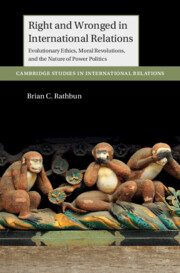 Right and Wronged in International Relations
Right and Wronged in International Relations Nationalism as Moral Revolution in German Foreign Policy
Published online by Cambridge University Press: 29 July 2023
Explanations for Germany’s aggressive and bellicose foreign policy during the Wilhelmine period often point to efforts by entrenched elites to distract from the country’s stunted democratic development by generating international threats to unify the country. These accounts fail to come to terms with the moral revolution occurring in Germany at the time – the rise of nationalism. The identification of the group as the nation, and the understanding that the nation’s welfare is the leader’s primary concern, required a revolution in the basis of authority, one which implied that the emperor owed loyalty to the people. The nationalist right began to question the indecisive policy of the Wilhelmine regime in a way that was previously ethically sanctioned, condemning the emperor in particular for a lack of will and resolve during the second Moroccan crisis. In a dangerous world, this amounted to moral castigation. I supplement this chapter with a survey experiment conducted on the American public. For those who hold dangerous world beliefs, four virtues generally thought to indicate “competence” – disciplined and hardworking, strong-willed and determined, tough and strong, and persistent and resolute – are actually used as moral benchmarks, particularly for leaders.
To save this book to your Kindle, first ensure [email protected] is added to your Approved Personal Document E-mail List under your Personal Document Settings on the Manage Your Content and Devices page of your Amazon account. Then enter the ‘name’ part of your Kindle email address below. Find out more about saving to your Kindle.
Note you can select to save to either the @free.kindle.com or @kindle.com variations. ‘@free.kindle.com’ emails are free but can only be saved to your device when it is connected to wi-fi. ‘@kindle.com’ emails can be delivered even when you are not connected to wi-fi, but note that service fees apply.
Find out more about the Kindle Personal Document Service.
To save content items to your account, please confirm that you agree to abide by our usage policies. If this is the first time you use this feature, you will be asked to authorise Cambridge Core to connect with your account. Find out more about saving content to Dropbox.
To save content items to your account, please confirm that you agree to abide by our usage policies. If this is the first time you use this feature, you will be asked to authorise Cambridge Core to connect with your account. Find out more about saving content to Google Drive.